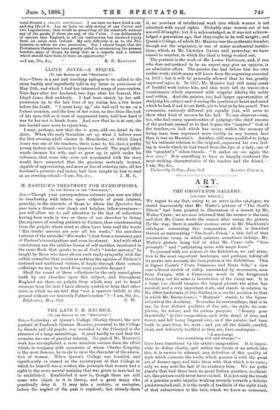THE LATE F. D. MAURICE.
[To THE EDITOR OF THE " SPECTATOR."]
SIR,—Yesterday, at Queen's College (Harley Street), the new .portrait of Frederick Denison Maurice, presented to the College by friends and old pupils, was unveiled by the Principal in the presence of a large assemblage. It need hardly be said that the -occasion was one of peculiar interest. No part of Mr. Maurice's work has accomplished a more manifest success than the effort which, in company with associates of whom Charles Kingsley is the most famous, he made to raise the character of the educa- tion of women. When Queen's College was founded, and significantly so named as the counterpart of that College in which he himself was a worker, the principle that women had a right to the same mental training that was given to men had to be established. Established it now is, though there are still some who object to it in theory, and a great many who practically deny it. It may take a century, or centuries, before the neglect of the past is repaired ; but already there is no province of intellectual work into which woman is not admitted with equal rights. Probably nine women out of ten are still ill taught; but it is acknowledged, as it was not acknow- ledged a generation ago, that they ought to be well taught ; and Queen's College, of which Mr. Maurice was the authentic founder, though not the originator, is one of many academical institu- tions, which, as Mr. Llewelyn Davies said yesterday, we have ceased to number, in which the ideal is being worked out.
The portrait is the work of Mr. Lowes Dickinson, and, if one who does not pretend to be an expert may give an opinion, is an admirable effort. The painter has had before him his own earlier work, which many will know from the engraving executed in 1857 ; but it will be generally allowed that he has greatly improved upon it. In 1857, Mr. Maurice had still many years of fruitful work before him, and this work left its traces on a countenance which expressed with singular fidelity the noble soul within. And the painter, too, had larger opportunities of studying his subject and of seeing the qualities of heart and mind which he had, if not to set forth, yet to hint at by his pencil. Two comments, curiously different yet equally just, will serve to show what kind of success he has bad. To one observer—one, too, who had many opportunities of judging—the chief success of the portrait seemed to be that it gave the " inspired " look of the teacher,—a look which has never, within the memory of living man, been expressed more visibly on any human face than it was on Maurice's. Another, still more qualified to judge by his intimate relation to the original, expressed his own feel- ing in words which he had heard from the lips of a lady, one of the " prophet's " oldest friends. " It makes me see again the dear man." It is something to have so happily combined the most striking characteristics of the teacher and the friend.— I am, Sir, etc.,


































 Previous page
Previous page